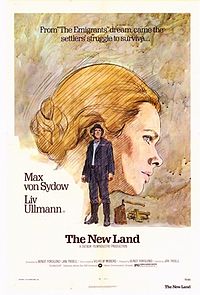The New Land
by Vilhelm Moberg
Karl Oskar, his wife Kristina and their three children, along with Karl Oskar's brother Robert and Robert's friend Arvid, have arrived in Lake Ki Chi Saga from Sweden. Taking shelter in a shanty, Karl Oskar pours all their resources into building them a house before winter arrives. He begins clearing the land of the tall pine trees, and with the help of Robert, Arvid and some of their Swedish neighbors, construct a small farmhouse.
Once the farmhouse is completed, Karl Oskar and Kristina invite their fellow Swedish settlers over for dinner, including Kristina's Uncle Danjel and Ulrika, who has become a very close friend of the family. After dinner, they discuss if they regret emigrating. Later that night, Karl Oskar tries to console Kristina and shows her something he had kept from when they had left Sweden- a shoe that had belonged to Anna, their eldest daughter who had died in Sweden. He tells her that it helps him to remember their home, which comforts her slightly. Not long afterwards, Kristina gives birth to a son, Danjel, named after her uncle. Robert, meanwhile, tells Arvid that he plans to head west to California to dig for gold, and asks Arvid to come with him. They head west, only to have their adventure plagued by a series of misfortunes. The two become lost in the desert, where Arvid dies from drinking tainted water. Robert is rescued by a Hispanic cattle driver, who brings him to a village in the Sierra Nevada. While there, Robert comes to possess a small fortune, only to have it swindled from him by another Swede. He returns to Minnesota, where after meeting again with Karl Oskar and Kristina, dies from a fever he contracted while out west.
250px|thumb|The Dakota War of 1862#Execution|mass execution of Sioux warriors is portrayed in the film.
In the following years, Kristina gives birth to two more children, Ulrika and Frank, after which a doctor, advises Kristina that after seven pregnancies her insides are torn, and another pregnancy will be fatal. However, Kristina decides to go against the doctor's warning, and eventually becomes pregnant again several times. After suffering several miscarriages, Kristina falls ill and becomes bedridden, gradually weakening. The Sioux Uprising of 1862 erupts when starving Sioux warriors kill more than 500 white settlers across the upper Midwest, among them Kristina's uncle Danjel and his eldest son Sven. Many of the warriors are subject to a mass execution.
Kristina dies in 1862, and Karl Oskar, overwhelmed by grief, withdraws into a state of solitude, watching his children grow up and start families of their own. His eldest son Johan takes over the farm, marries an Irish girl and before long has a large brood of five children. Marta marries another Swedish immigrant from Ljuder parish, who later purchases the general store in Center City which they operate together while raising a family of three children. Harald leaves for Minneapolis and works for the railroad, eventually becoming a successful businessman and marrying a German woman, with whom he has two children. Dan remains a bachelor and stays behind on the farm to help Johan, while Ulrika marries a Norwegian farmer from nearby Franconia township and has a family of four children. Frank has since moved to Chicago and married a Yankee girl. Karl Oskar often visits Kristina's grave overlooking the river, tending to the flowers growing around it faithfully while in the distance, hammering sounds can be heard as other Swedes have also begun moving into the area in large numbers and establishing farms. On her grave marker, beneath her name it reads "We Shall Meet Again".
Karl Oskar dies on the evening of 7 December 1890. A neighbor, Axel Andersson, writes a letter to Karl Oskar's sister Lydia back in Sweden informing her of the death. In his letter, Andersson explains that Karl Oskar's children had by then forgotten Swedish and that he often reminded him to write to his sister informing her of his eventual death. Also included with the letter is a family photograph showing Karl Oskar surrounded by Johan, Marta, Harald, Dan, Ulrika and Frank, their respective spouses and all their own children.
